Essentialism – Book Summary
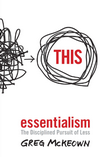
Short Summary
Becoming the essentialist is joining a selected few people who found a way to design a simple and balanced life that is worth living. The Essentialist:
- understands that most things are unimportant and focuses on a a vital few
- is ultra aware of the power of choice - the ability that most people lost
- says NO comfortably and gracefully without the fear of being judged
- prioritizes ruthlessly - makes 1 decision that eliminates a thousand others
- sets powerful boundaries and routines - gets more outcomes will less effort
- simplifies life leaving more time to enjoy the things that truly matter
Full Review
This book is for those people who feel totally overwhelmed with their life, career, business, and personal matters. If you feel like there is not enough time in a day this summary will make your life much better. It will simplify it. If you succeed in internalizing the concepts McKeown offers in his book you will find the much needed answers.
The 4 Pillars Of Essentialism
McKeown divides his book into the 4 main parts:
- Essence - understand essentialism
- Explore - explore ways to discern the unimportant from critical
- Eliminate - eliminate the unimportant
- Execute - make high-performance automatic
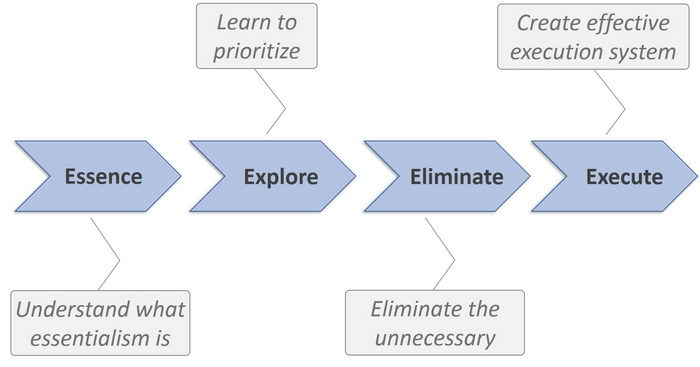
Part 1 - Essence - Understanding Essentialism
McKeown starts his book with explaining what Essentialism is and why you should care.
1. The Essentialist
The Essentialist is consumed by the idea that almost everything is unimportant and only a few things are truly essential in life and are worth paying attention to.
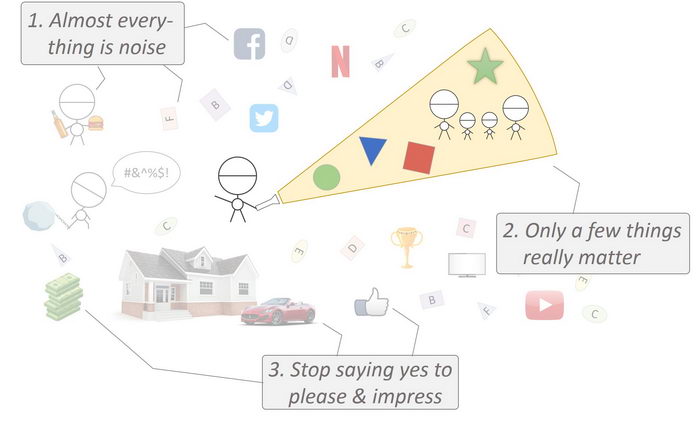
The Essentialist understands that:
- contrary to popular belief living a balanced and life is possible by focusing on the vital few and eliminating the trivial many
- saying NO to good is the only way to say YES to great (getting comfortable saying NO to co-workers, bosses, clients, friends, and even family members is a must skill in life)
- simplifying life by eliminating the unimportant is more critical than becoming ultra productive
- if they don't prioritize their life, someone else will
- essentialism is not about getting more things done, it's about getting the right things done
- taking millions of steps in ONE direction is much more rewarding than taking ONE step in million directions
Non - Essentialist | Essentialist |
|---|---|
|
|
The paradox of success:
- We become productive and successful through hard work, persistence, and patience
- With that we accept more and more commitments
- More commitments lead to spreading ourselves thin
- We get distracted from what really matters and fail miserably. At this point it's time to simplify
Rather than reacting to what the life throws at them, they work hard to get into the habit of making their own choices to live by design, not by default.
2. Choose - The Invincible Power Of Choice
Once we accept the unimportance of practically everything, the next step is to raise the awareness about the power of choice. Like a desperate fly trying to break through the window and eventually dying without realizing the open door was just a meter away, we give up our ability to choose.
We keep accepting more and more choices life throws at us: job, business, social media, news, friends, family, movies... Eventually we burn out and apathy kicks in. We feel hopeless, and like the poor fly we also ...
But McKeown comes to the rescue with a simple truth: once we become ultra aware of our ability to choose, we unblock our life. We find the door. And we break through. Re-read it again. It liberates.
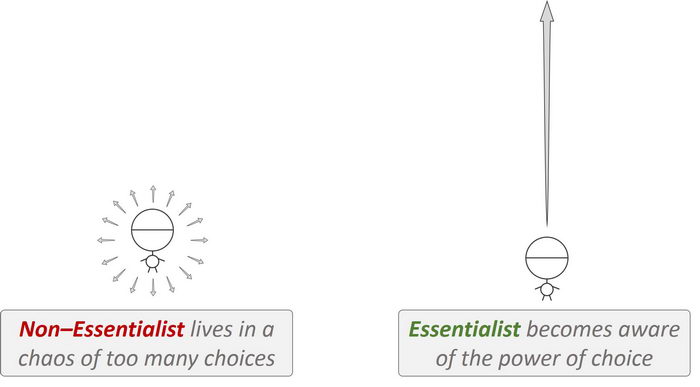
The more choices we have, the more decisions we have to make, the more the quality of our decisions deteriorates.
Non - Essentialist | Essentialist |
|---|---|
|
|
3. Discern - The Unimportance of Practically Everything
The way of the essentialist is to eliminate all stupid choices from his or her life. The only way to realize the simple truth of unimporance of practically everything is to allocate regular time slots for thinking about it.
The main problem however is that people are either too busy or too lazy to find time for deliberate thinking. Ask 100 people to find regular time blocks for this activity and you will see what I mean:
- What? Spend time contemplating about what's important? I have too much on my plate! I am too important and too busy! Do you know who I am?! You have no idea! Or...
- Forget about it! My favourite show starts in 2 minutes! No time for stupid thinking! Life is short!
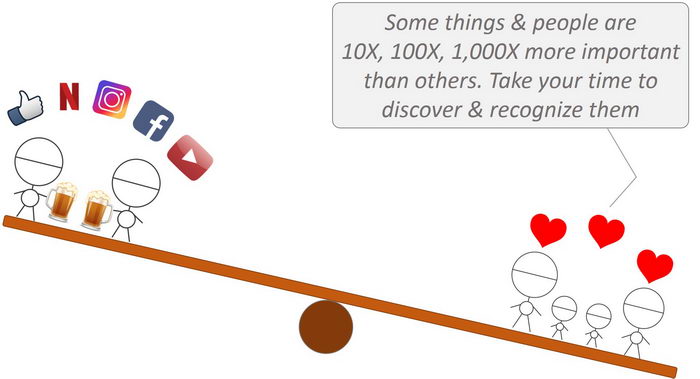
McKeown proves his point with numerous examples demonstrating how highly successful and extremely busy people still find time for deliberate thinking about the choices they make.
Non - Essentialist | Essentialist |
|---|---|
|
|
By the way, what are you doing today? Got time for thinking about what matters the most in your life?
4. Trade-Off - Which Problem Do I Want
But how do we go about deciding what's important and what's not ?
McKeown suggests a very effective technique that involves inverting typical common-sense questions. For example, instead of asking "How can I have both things?" ask "Which problem do I want ?". The reason for that is simple: every choice brings problems. But some choices are less problematic. Consider the following scenario:
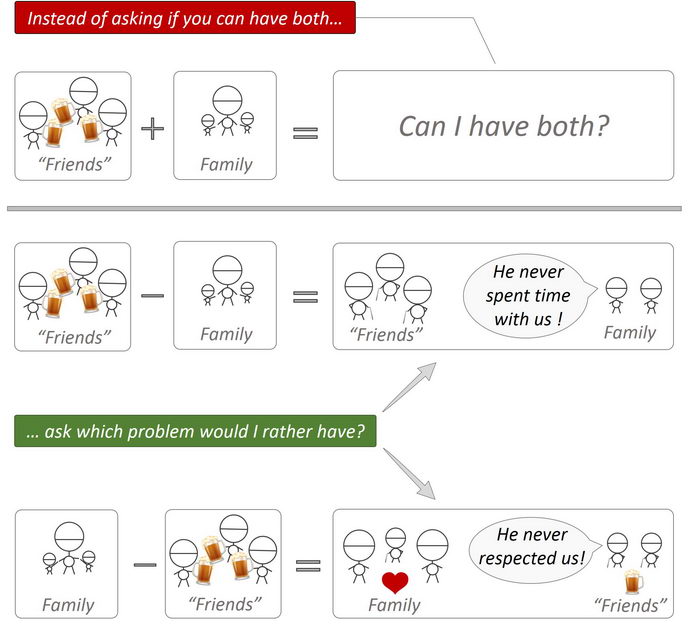
Here is another one: replace "What do I want to give up?" with "What do I want to go BIG on?".
Non - Essentialist | Essentialist |
|---|---|
|
|
Once we understand that choices are all about trade-offs, a moment of clarity occurs. Instantly, it becomes much easier to make the right decisions to separate what truly matters from the noise.
Part 2 - Explore
The second part of the book is dedicated to our highest priority in life: mastering the skills of ruthless prioritization. The author provides actionable systems for selecting the vital few from the trivial many.
5. Escape - The Perks of Being Unavailable
If you are convinced that the way of the Essentialist is for you, your very first action is to slow down and to give yourself permission to escape from the busy (or in some cases lazy) life.
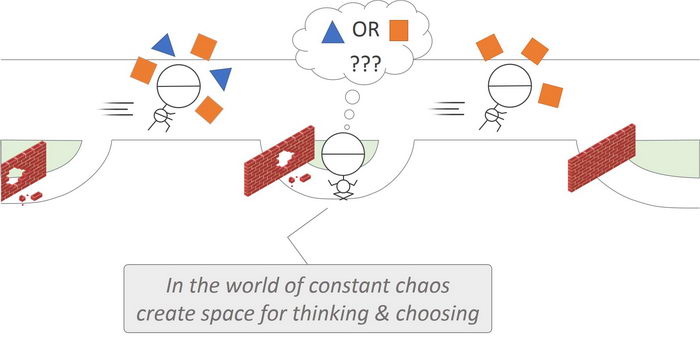
Here is how to do it:
- carve out space in your life for periodic thinking about what's essential and what's not and for mastering the skill of saying NO
- design your life by yourself - ensure there are no distractions and you are alone
- think - do nothing else, just think. No multitasking, no switching to other "more important" tasks. Simply think about 98% of the unimportant and about 2% of the important in your specific situation
- label things and people as black and white even if it sounds harsh even if you are scared about their reaction. They don't know yet that you declared the war on the unimportant. That you are in the process of waking up and disconnecting from the matrix of too many unnecessary choices
- too busy or too lazy for the above? That's OK, you don't have to, but the life will only get busier or lazier from here. Wake up and find the time. Now. Just stop and think for ONE minute: what ONE unimportant thing could you remove from your life right now and what ONE important thing you could allocate this extra time for?
6. Look - See What Really Matters
McKeown says we should stop hyper-focusing on minor details and start looking at the big picture instead to understand what really matters.
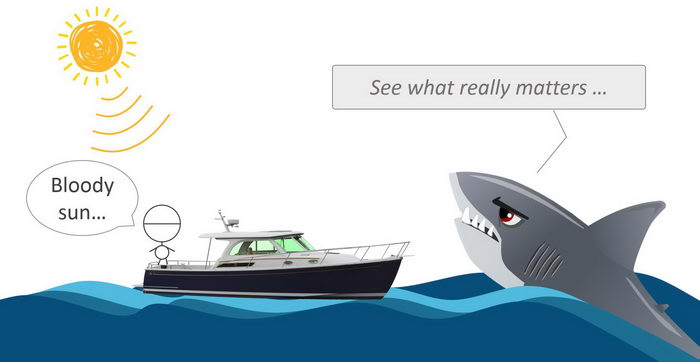
- Be a detective - always look for the most important things in stories, events, circumstances
- Use role play - put yourself into someone else's shoes to understand their motives and reasoning
- Listen for what is not explicitly stated but what is crucially important
Non - Essentialist | Essentialist |
|---|---|
|
|
7. Play - Embrace the Wisdom of Your Inner Child
Play is a very important part of the Essentialism game because it creates a platform for exploration.
What is play? Anything we do for joy that stir playfulness in our adult minds. Things that kids do. Using imagination, having fun, being involved in crazy games with kids, and doing anything that interrupts the pattern of seriousness and busy work.
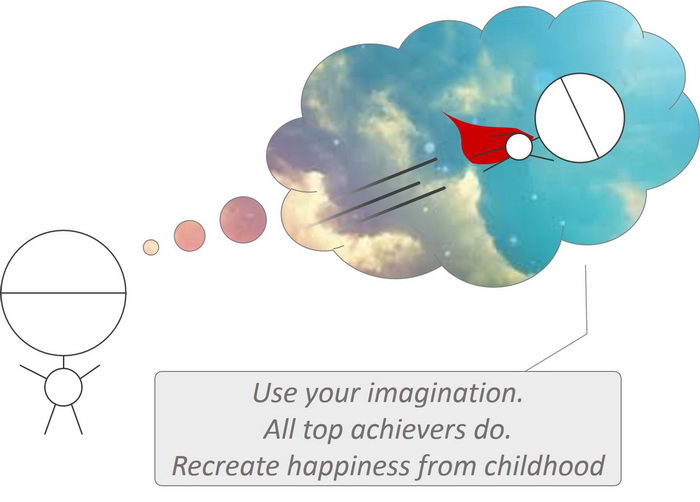
Multiple research studies indicate that the best athletes, movie stars, business magnates, inventors, CEOs and thinkers deliberately use their imagination on a daily basis. Play doesn't just help us explore what is essential. It IS essential itself.
Non - Essentialist | Essentialist |
|---|---|
|
|
8. Sleep - Protect the Asset
While essentialists live much simpler lives they still work hard to enjoy a balanced life style. At the end of the day if you want to enjoy (or eventually scaled down to) an 8 hour work day be it your business or career, you better work hard and stay focused to enable this balance.
Essentialists understand that they have got to protect the most important asset they have: themselves.
They have no guilt in having as much sleep as their body and mind need to recharge and to have enough energy to operate at the highest possible level of contribution.
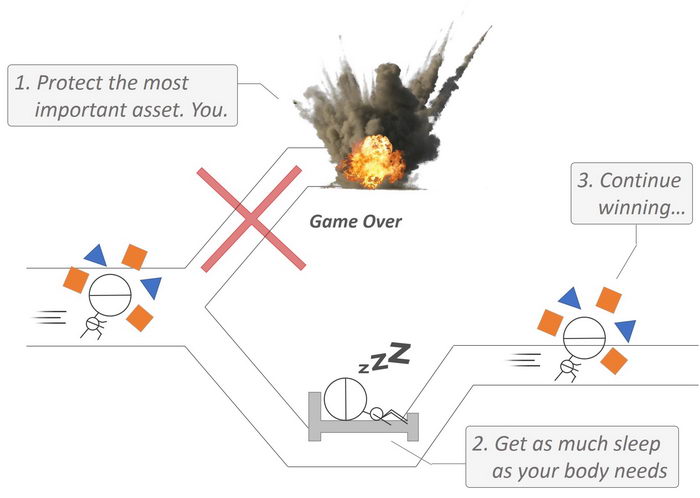
Jeff Bezos, the founder of the Amazon empire, has 8 hours of solid sleep each night. If someone like him can find time to protect the body and mind from gradual deterioration, why can't more busy people follow the suit?
Non - Essentialist | Essentialist |
|---|---|
|
|
9. Select - The Power of Extreme Criteria
The author suggests 2 powerful frameworks for prioritizing ruthlessly.
If it's not "Hell, Yeah !!!" Then It's NO
When making a decision on what's important and what's not identify the most important criteria and give it a score from 0 to 100. If it's anywhere below 90 just say NO. Even if it's 89 ! Say NO to good to say YES to great.
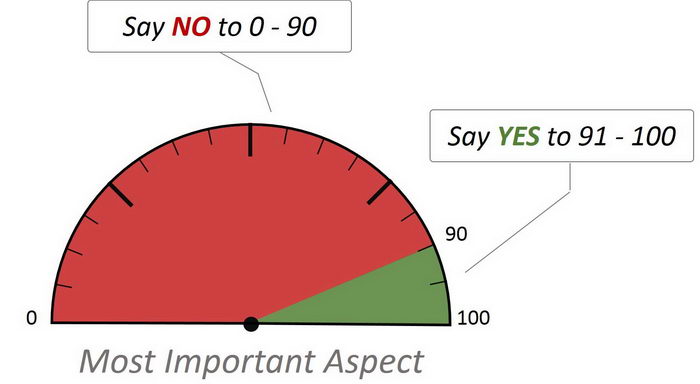
9.1 Three-Three-Five Method
Another approach you can use is to identify 3 + 3 = 6 selection criteria and ensure 5 of them have been met:
- Start with 3 minimal criteria. Don't have all 3 ticks? Destroy the task immediately, otherwise proceed to the next step
- Identify 3 ideal criteria. Just 1 tick? Eliminate. Two or three? You just found your next ONE thing
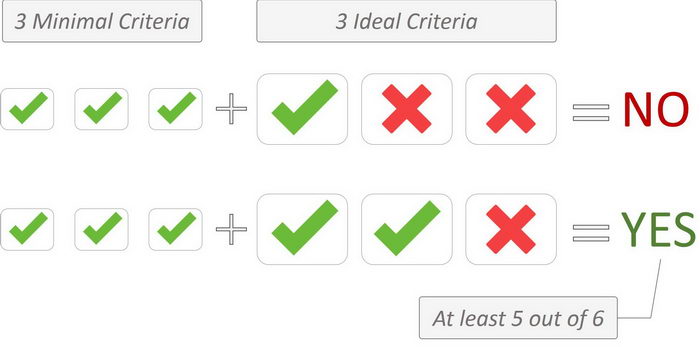
Non - Essentialist | Essentialist |
|---|---|
|
|
Part 3 - Eliminate
The 3-d part of the book is all about fearlessly eliminating the unnecessary. Everything from finding your next ONE thing to learning to say NO gracefully and setting the boundaries.
10. Clarify - One Decision That Makes a Thousand
A serious lack of clarity brings stress, confusion, and frustration in both individual and team environments.
McKeown explains that powerful planning and goal setting must be approached with the 2 angles in mind:
- Inspirational VS Boring
- Concrete VS Generic
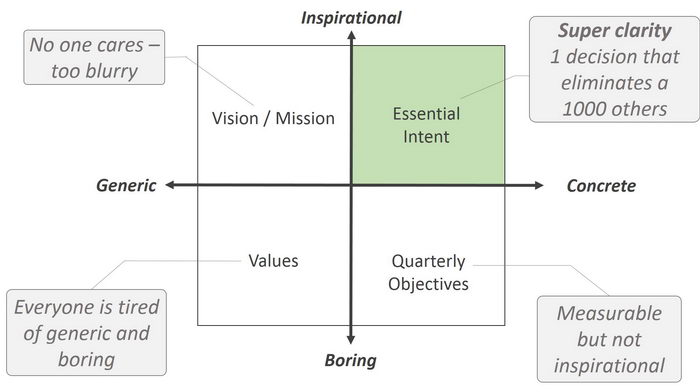
Non - Essentialist | Essentialist |
|---|---|
|
|
If we don't go for inspirational and concrete goals we get frustrated: individuals lose enthusiasm and teams disintegrate without a powerful purpose. it takes time and courage to come up with an essential intent.
11. Dare - The Power of a Graceful “No”
Speaking about courage, saying NO is extremely hard before it gets easy. When you know it's the right time to say NO separate the decision from the relationship.
For example, imagine your boss or your client demands too much from you stretching your ability to leave on time and be with your family. If you believe that your family is more important than working 24 x 7 and pleasing "the master" you might be happy to risk losing your job or the client. Why not find a new leader or a new client who will respect your boundaries ?
That's why it's so important to allocate regular time slots for thinking about such matters.
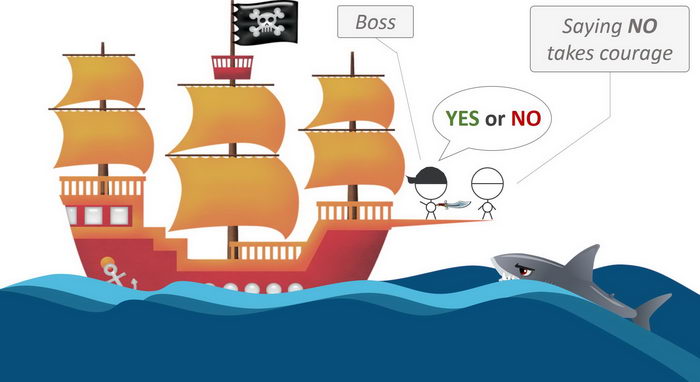
Here is a few graceful ways to say NO without feeling bad about it:
- Awkward pause - let the other person fill the gap and reverse the attempt to breaking the boundary
- Not now, maybe later - "I can't do it now, might find some time later, but can't promise anything"
- Artificial delay - "Let me check my calendar, I will come back to you"
- Yes, but let's deprioritize - If I take it on-board, what do I stop working on ?
- Use humor - find a funny way to say no: "My husband will feed the kids with rotten tomatoes again..."
- It's NO from me, but try another person - I can't commit, but here is another person who can help
Non - Essentialist | Essentialist |
|---|---|
|
|
12. Uncommit - Win Big by Cutting Your Losses
McKeown explains the paradox of sunk-cost bias - our inability to stop investing time, money, or energy into something we know is not working simply because we are already sunk in a cost and we can't get back
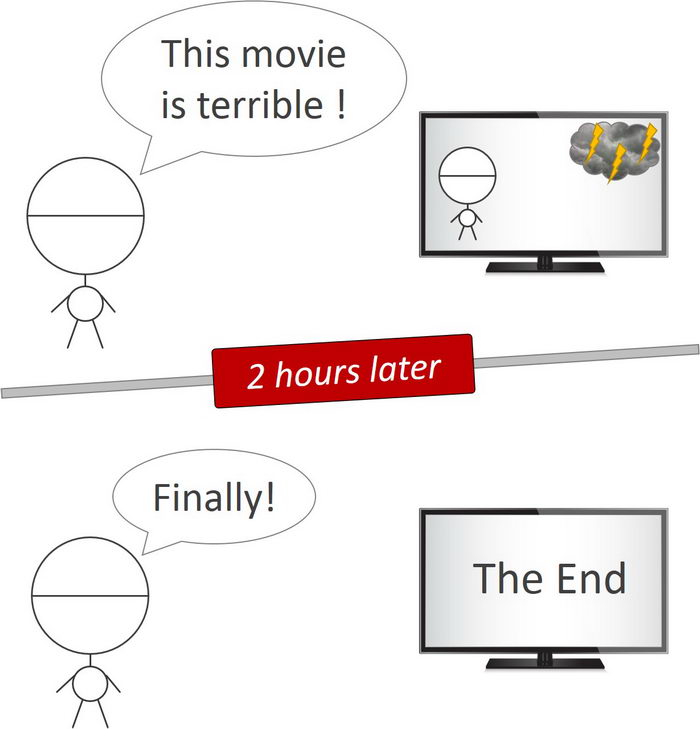
Here is a list of actionable strategies to use to cut down losses quickly:
- Remove and assess - test if removing someone or something from your life makes any difference. Example: get off Facebook or LinkedIn for a month and see if anyone noticed it or cried about it. If not, you are free
- Admit mistakes - it makes you wiser and lets you move on instead of being stuck and suffering for no reason
- Get a second opinion - sometimes someone else can help you get out of the rut due to not being emotionally attached
- Pretend you don't own it yet - whatever it is you are afraid to lose, pretend you don't have it yet. How much would you pay for it or spend time on it now to get it ?
Non - Essentialist | Essentialist |
|---|---|
|
|
13. Edit - The Invisible Art
Blockbuster movies that win Oscars are edited ruthlessly before being released. Learn from the best and become an editor of your life by treating it as a movie. Ruthlessly remove what's not working from your life.
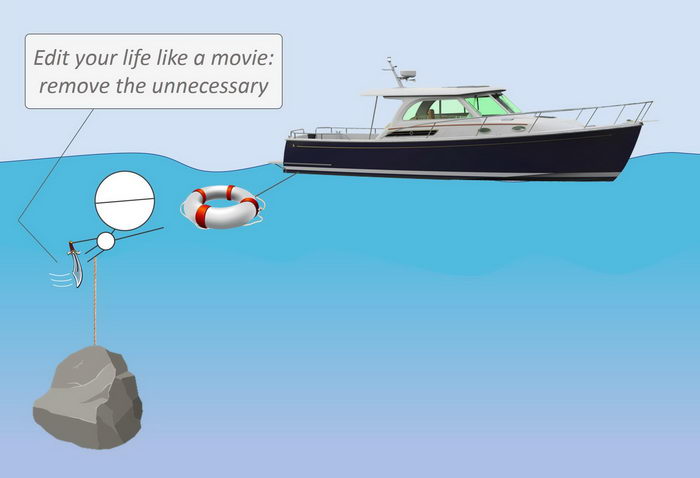
McKeown suggests the following process:
- Cut - eliminate as many unnecessary options as possible
- Condense - be clear and concise. Do more with less
- Correct - correct your course when necessary when something doesn't work
- Edit less - don't be obsessed with editing too much, don't overdo it
Non - Essentialist | Essentialist |
|---|---|
|
|
14. Limit - The Freedom of Setting Boundaries
Protect your time from distractions and people who abuse your time by setting powerful boundaries. Build the wall to enjoy spending time on what matters the most to you
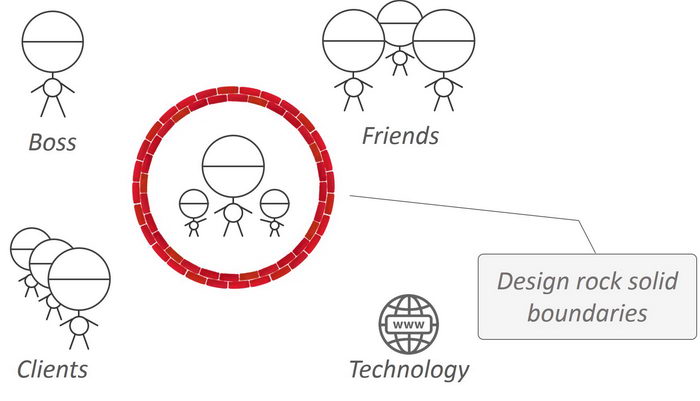
Do the following:
- lock yourself in a room to eliminate personal interruptions
- disconnect from the world by leaving all your gadgets in a different room
- add a signature to your email that you only check it once or twice a day
- use a pomodoro technique to protect your time and work deeply
- сomplete our mini-course on protecting the mind
Non - Essentialist | Essentialist |
|---|---|
|
|
Part 4 - Execute
In the final part of the book McKeown answers a critical question: "How can we get to the point of doing the vital few things almost effortless ?"
15. Buffer - The Unfair Advantage
Essentialists understand that life is unexpected and can hit very hard at any time and from any direction. They spend a substantial amount of time preparing for bad times and unexpected things. They know this safety net will pay off big way when the unexpected happens.
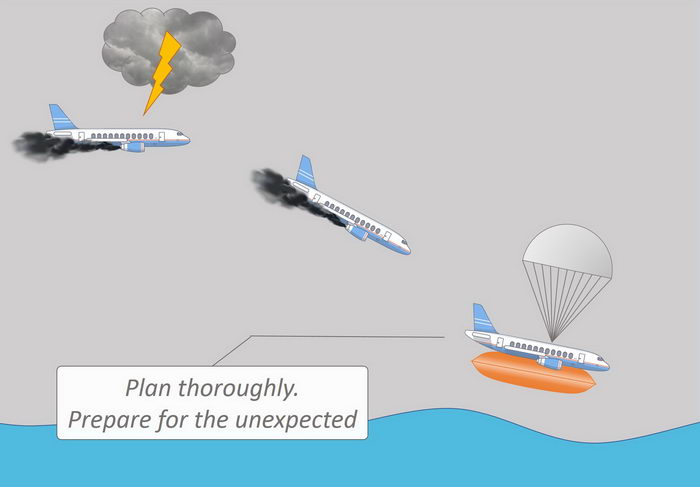
The author suggests the following techniques for planning:
- use extreme preparation - collect as much information as possible, but don't get stuck in perfection
- add 50% to critical estimates - take into account our poor ability to estimate correctly and our tendency to underestimate due to social pressures
- introduce scenario planning - identify risks, worst case scenarios, social effects, financial impacts, and other unexpected things. Think about how to reduce the risks and improve resilience.
Non - Essentialist | Essentialist |
|---|---|
|
|
16. Subtract - Bring Forth More by Removing Obstacles
Essentialists know the secret of moving fast in the crazy world of rapid change. Instead of working more they remove more. They look at the whole system as a chain, identify the weakest element, and eliminate it with passion. And after that? They rinse and repeat.
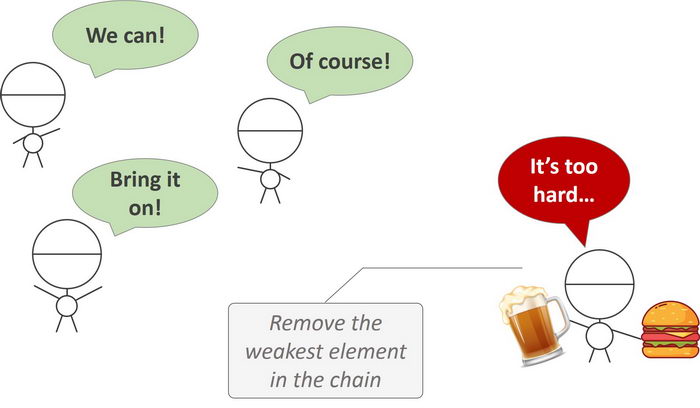
Non - Essentialist | Essentialist |
|---|---|
|
|
17. Progress - The Power of Small Wins
To win BIG in life start SMALL:
- adopt the concept of MVP - minimal viable progress to keep yourself motivated all the time
- ask yourself "What's is the smallest step I can take that will be valuable to the important task I am trying to achieve"
- split a major task into smaller chunks and start with the first one (exactly what Brian Tracy says in Eat That Frog book)
- visually reward progress by introducing a task management and task tracking system
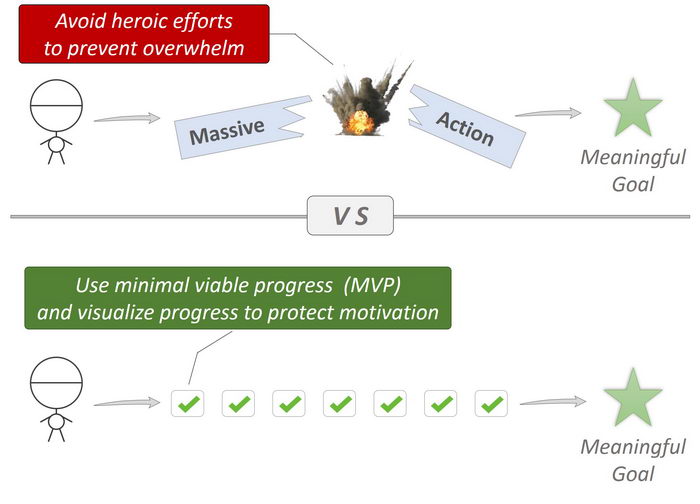
Non - Essentialist | Essentialist |
|---|---|
|
|
18. Flow - The Genius of Routine
McKeown says designing routines helps achieve important goals on auto-pilot. He refers to multiple research studies and explains why developing routines is critical:
- most of our actions are habitual meaning we do things on auto-pilot without even thinking about it
- when this happens the brain doesn't waste energy on making decisions which is good and leaves a lot of energy for creative work but the question is...
- what kind of habits and routines dominate in your life ? Good or Bad?
- habits have 3 parts: trigger, behaviour, reward. Identify the trigger and replace the behaviour to get the same reward
Here is an example on how to set a powerful routine of becoming an expert in your field by taking small daily actions:
- Step 1 - Preparation: prepare a list of educational materials upfront to eliminate any resistance in the future
- Step 2 - Trigger: you come home tired
- Step 3 - Behaviour: most people watch a TV to "decompress". Instead replace this behaviour with reading or watching educational materials you prepared in step 1. Here is why step 1 is crucial, when you are tired and no material is available watching a TV is much easier - it doesn't make you think. Looking for the material though requires quite a few steps which takes willpower but it's already depleted. Make it easy to do the right things.
- Step 4 - Reward: introduce a visual system for celebrating another small step towards becoming an expert in your field
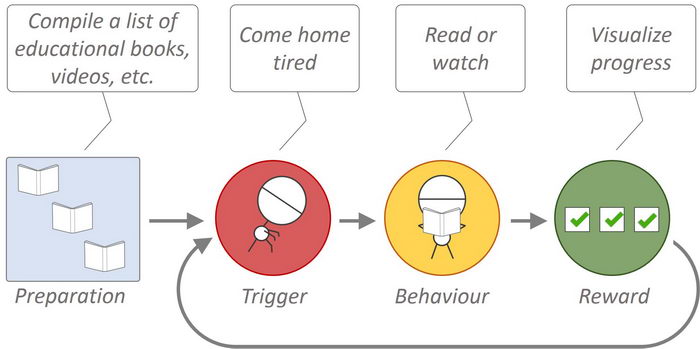
Non - Essentialist | Essentialist |
|---|---|
|
|
19. Focus - What’s Important Now
To operate at peak performance levels requires you to be present by focusing on what is important right now. Therefore do the following:
- Eliminate multi-tasking - our brains can do 2 or more things at a time, they have to keep switching between the tasks
- Stop travelling to the past to relive painful experiences
- Prevent travels to the future to imagine terrible scenarios
- Stay in the present moment, right here and right now
- Ask yourself "What minimal progress can I achieve right NOW ?" Remember, the past can't be changed and the only time you have to build your future is now
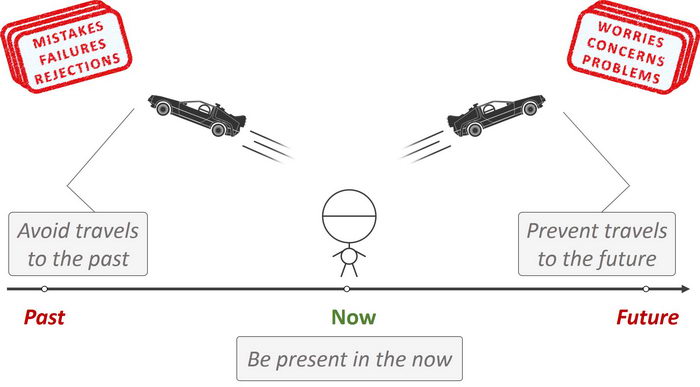
Non - Essentialist | Essentialist |
|---|---|
|
|
20. Be - The Essentialist Life
Essentialism is not what you do, it's who you ARE. It's your new identity.
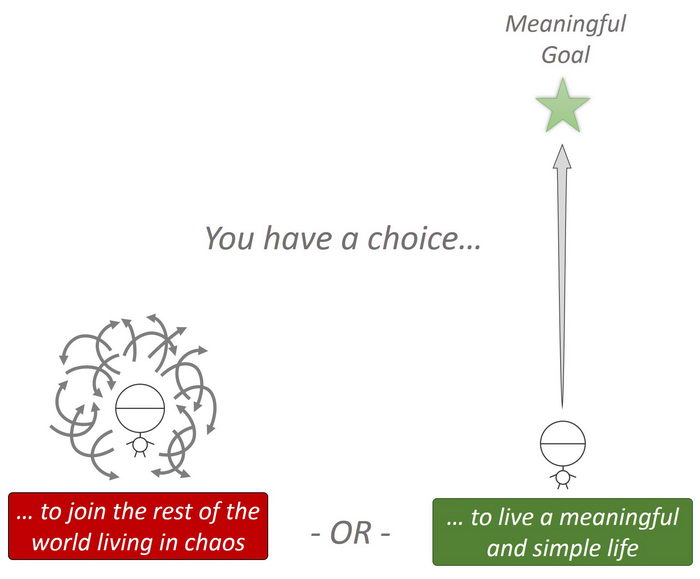
Non - Essentialist | Essentialist |
|---|---|
|
|
Once you have understood the above principles at the emotional level, Essentialism becomes your nature.
If you are still not sure what Essentialism is and if you don't understand why saying NO to more people and "opportunities" is critical, by all means keep getting busier. Burning out is one of the best ways to eventually get it.
If however, you believe the time has come to simplify your life and ruthlessly eliminate the unimportant then start taking small steps (remember MVP ?) towards becoming the Essentialist. It takes time. But it's worth it.
You are either ready for Essentialism and you will find time -OR- you are too busy getting busier and missing life.
The choice is yours.
Subscribe For More
Love our reviews? Subscribe to never miss another one:
